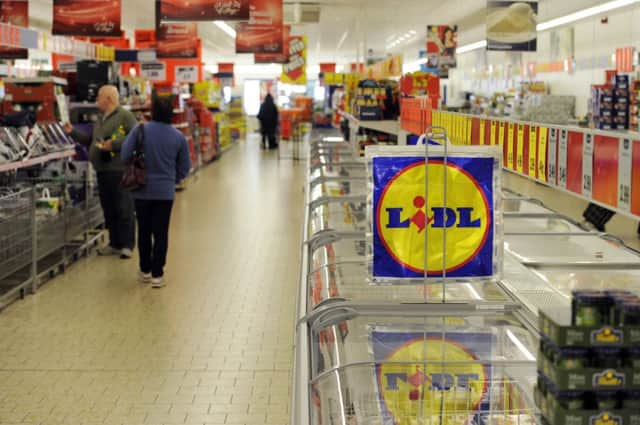Suppliers risk being forced out in supermarket wars


However, the report, from business recovery specialist Begbies Traynor, showed that overall levels of distress among Scottish companies fell in the final three months of 2014.
The firm’s Red Flag Alert found suppliers have become the worst-hit casualties of “brutal” competition between the UK’s major supermarket chains, which are facing increased pressure from discount rivals.
Advertisement
Hide AdAdvertisement
Hide AdIndustry figures earlier this week showed that cut-price grocers Aldi and Lidl have enjoyed stellar sales rises during the past three months and more than half of all British households visited at least one of the German retailers over the festive season.
Market researcher Kantar Worldpanel said takings at Aldi soared 22.6 per cent in the 12 weeks to 4 January, with Lidl’s sales growing by 15.1 per cent. Among the “big four” chains, Sainsbury’s put in the best performance over the period but still saw its sales dip by 0.7 per cent compared with a year ago.
Begbies Traynor said retailers had been squeezing suppliers’ profit margins and stretching payment terms in a bid to offer consumers the lowest prices, and the number of firms in the sector in “significant distress” jumped 92 per cent to 1,410 in the final quarter of 2014.
Julie Palmer, a partner with the firm, said: “Unless the supermarkets start treating their suppliers more fairly and find longer-term solutions to their cost-cutting exercise, we expect that more than 100 of these 1,410 ‘significantly’ distressed food and beverage suppliers will fall into administration before the year is up.
“Worryingly, with 3.6 million people employed in the UK food supply chain, the economic and political risks associated with the current price war are reaching boiling point ahead of May’s election.”
In Scotland, the firm said that a total of 11,989 firms showed instances of significant financial stress in the three months to December, down 2 per cent on a year earlier.
Meanwhile, the number of companies north of the Border rated as being in “critical” condition, such as those facing winding-up petitions, dropped 32 per cent to 106.
Ken Pattullo, group managing partner at Begbies Traynor in Scotland, said: “Retailing is still tough everywhere, and although the leisure, hotel and hospitality sectors continue to see a welcome fall in significant distress, the rises in critical instances for these sectors show that there are still too many Scottish leisure business to close to failure.”
Advertisement
Hide AdAdvertisement
Hide AdThe Red Flag Alert research, which monitors the financial health of UK companies, also found that the number of food retailers in significant distress rose 58 per cent to 4,552, the vast majority smaller firms.
The findings of the report, published yesterday, reflect the difficulties facing small independent convenience stores as supermarkets grow their networks of smaller stores and Aldi and Lidl – which source much of their canned and packaged stock – expand rapidly.
Palmer added: “With the battle lines drawn, the supermarket price war is intensifying and it looks like the UK’s smallest food suppliers are bearing the brunt.”
SUBSCRIBE TO THE SCOTSMAN’S BUSINESS BRIEFING